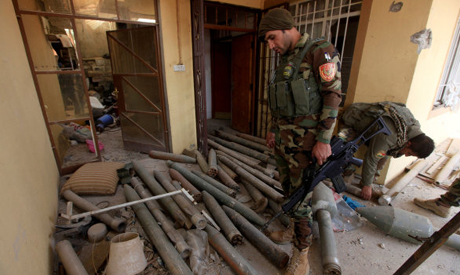
A member of Peshmerga forces inspects a house that was used by Islamic State militants in the town of Bashiqa, after it was recaptured from the Islamic State, east of Mosul, Iraq November 10, 2016 (Photo: Reuters)
Iraqi Kurdish fighters are building a berm in the desert near Mosul that could demarcate a boundary of the state they hope to establish after the Islamic State (IS) militant group is defeated.
They have been working methodically, like in a factory line, packing dirt into sacks, sealing them and then stacking them firmly atop the berm cutting across the sands near the battleground city.
Armed with bulldozers and shovels, the Kurdish forces are fortifying the barrier, about 60 kilometres (40 miles) west of the Kurds' regional capital Arbil, that separated them from Iraqi federal forces.
This line in the sand may ultimately delineate some of the territory that the autonomous Kurdish region in northern Iraq aims to keep after the end of the war against IS militants-- a goal that could increase tensions with Baghdad.
While federal forces still have weeks if not months of fighting ahead in the Mosul area, Kurdish peshmerga fighters say their objectives have been completed less than a month into the operation.
"If the peshmerga enters an area and liberates it, it will stay with the peshmerga," said a local Kurdish chief, Major General Jamal Weis.
Kurdish forces have gained or solidified control over swathes of northern territory that is also claimed by Baghdad in the course of the war against IS.
Starting from near the village of Shaqouli, AFP correspondents drove along the sand berm for at least 20 kilometres (14 miles), and the barrier still extends to the northwest.
After chasing IS out of the town of Bashiqa, northeast of Mosul, the peshmerga forces say they have fulfilled their side of the deal in the battle for Iraq's second city.
"According to the plan we set with the unity government, the peshmerga has now accomplished all the goals set for it," said Jabbar Yawar, secretary general of the Kurds' peshmerga ministry.
Peshmerga commander Major General Aziz Weis agreed: "All the areas that had been set as targets for us are finished."
Asked about the newly-erected sand barrier, Yawar said it was meant to protect Kurdish forces against potential IS car bombings or suicide attacks.
"We are not redrawing geographic borders. This sand berm is to protect the peshmerga from future operations by Daesh," he said, using an Arabic acronym for IS.
But analysts say the barrier -- as well as the peshmerga's presence in territory like Bashiqa and oil-rich Kirkuk province to the east -- indicated more long-term objectives.
"The peshmerga's defensive lines may be justified rhetorically as defences against IS attacks," said Patrick Martin from the US-based Institute for the Study of War.
"But they also are indicators of a new reality in Iraq that the KRG (Kurdistan Regional Government) has de-facto extended its control over a significantly larger portion of Iraq than previously held," he said.
Going forward, the KRG will focus "on ensuring that they retain control over the terrain that the peshmerga presently occupy and work to integrate these areas into the Iraqi Kurdistan region," said Martin.
Nate Rosenblatt, a researcher at the University of Oxford, said the berm was "the product of years of informal influence in these areas by the KRG".
He expected the peshmerga to "impose strict controls for those who can travel to Mosul from Bashiqa and the surrounding areas in the future".
A new peshmerga checkpoint has already been set up on the main road from Arbil towards Mosul.
The first Iraqi army checkpoint stands a few hundred metres (yards) away, with the two positions already operating like border crossings.
The peshmerga search truckloads of displaced Iraqis fleeing IS-held Mosul towards camps in Iraqi Kurdistan, and they also examine papers authorising displaced civilians in Kurdish-controlled territory to travel west to check on their homes in villages held by Iraqi forces.
"As military personnel, we are responsible for holding this border," said Brigadier General Kamal Majid Fakhri, a local peshmerga official visiting the checkpoint.
"The peshmerga will stay in control of this area in coordination with the asayish (Kurdish internal security) to keep it stable. This is all in service of the residents of this region."
Short link: